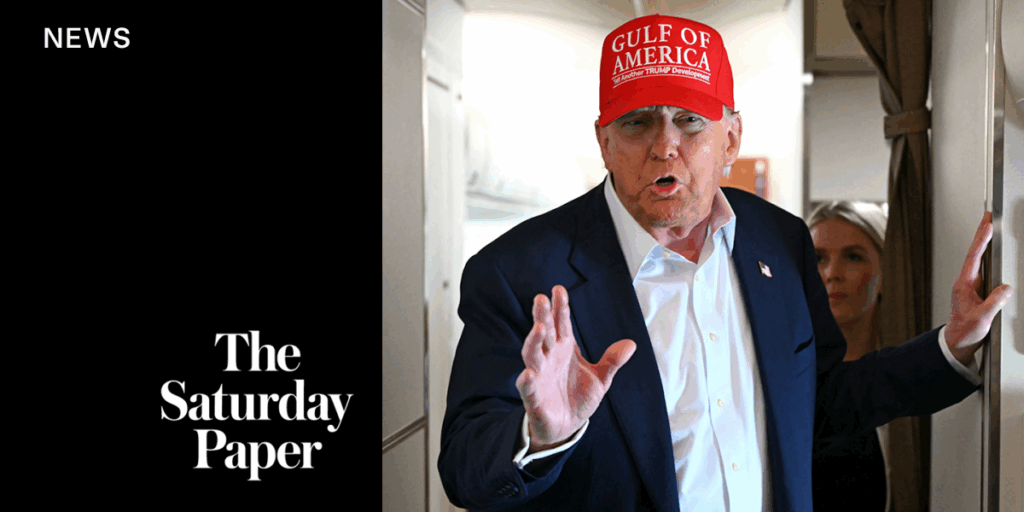
The recent G7 summit in Canada was marked by an unusual dynamic, often referred to as a meeting of the “group of six plus one.” This description humorously encapsulates the unpredictable presence of Donald Trump, likened by a senior Australian government source to a “pissed uncle at Christmas”—unpredictable and erratic. This characterization highlights the challenges faced by global leaders in navigating Trump’s second administration, particularly in the realm of international trade.
Trump’s abrupt departure from the summit caused a significant disruption, notably for Australian Prime Minister Anthony Albanese, who missed a crucial face-to-face meeting with the U.S. President. This meeting was intended to discuss key issues, including the lifting of tariffs on Australian goods and the AUKUS nuclear-powered submarines deal. Six months into Trump’s second term, his administration’s policies have already reshaped global trade and security relations, leaving allies like Australia grappling with the new realities.
Challenges in U.S.-Australia Relations
The media and political opposition have highlighted Albanese’s struggle to secure a meeting with Trump, having only managed three phone calls so far. Despite this, insiders suggest that Albanese is adapting to the situation. A senior government source noted, “It is what it is. Donald Trump is unpredictable. You can come to agreements. He’ll change them a day later.” The impact of Trump’s tariffs on Australia has been minimal, given that the U.S. is not Australia’s top trading partner, yet the focus on Trump remains intense.
Trade Minister Don Farrell emphasized the urgency for the U.S. to finalize deals with its trading partners before Trump’s comprehensive tariffs take effect. The deadline for “90 deals in 90 days” is looming on July 9, with only the United Kingdom and Vietnam having announced agreements. The U.S. President has indicated no intention of extending this deadline, despite having postponed the higher levies once already.
Adapting to Trump 2.0
Australia’s diplomatic channels are evolving to cope with the altered landscape under Trump’s leadership. Former Australian ambassador to the U.S., Arthur Sinodinos, remarked, “The Australian system has to adapt to the new world we’re in under Trump 2.0.” This adaptation involves finding innovative ways to capture the President’s attention, as traditional diplomatic norms are being challenged.
Despite the hurdles, the Australian government remains committed to negotiating tariff exemptions based on longstanding free trade agreements and trade deficits with the U.S. However, the official channels are significantly altered, with a close-knit group of Trump’s friends and donors holding considerable influence. This necessitates a keen awareness of who holds sway in Trump’s inner circle.
The Global Trade Landscape
Trump’s trade strategy has already led to a flurry of activity, with agreements being reached with the UK and Vietnam. However, these deals are often criticized for their lack of substance. Economist Justin Wolfers pointed out the superficial nature of the UK deal, describing it as “real night-before homework stuff.” The agreement with Vietnam, while reducing tariffs on some exports, still leaves much to be desired in terms of detail and scope.
“He’s barely thinking about Japan, which is an enormously important country and trading partner,” Wolfers noted, highlighting the transactional nature of Trump’s approach.
As the July 9 deadline approaches, the pressure mounts on Trump to deliver tangible results from his trade negotiations. The administration’s reliance on executive orders further complicates matters, as future administrations could easily overturn these decisions.
Looking Ahead: Australia’s Strategic Position
For Australia, building a rapport with Trump is crucial to advancing its interests, particularly in securing the $368 billion deal for nuclear submarines currently under Pentagon review. Sinodinos emphasized the importance of face-to-face meetings between Albanese and Trump to discuss trade matters and the future of AUKUS.
Australia’s strategic advantages, such as its regional presence and military collaborations, are significant assets in its relationship with the U.S. However, as Wolfers pointed out, these advantages only hold leverage if Australia is willing to use them as bargaining chips in negotiations.
As the international summit season approaches, the pressure remains on Albanese to navigate these complex dynamics and secure favorable outcomes for Australia. With parliament set to return on July 22, the stakes are high for both domestic and international policy.
In the ever-shifting landscape of global trade, Australia’s ability to adapt and engage with the unpredictable Trump administration will be crucial in maintaining its strategic interests and alliances.







